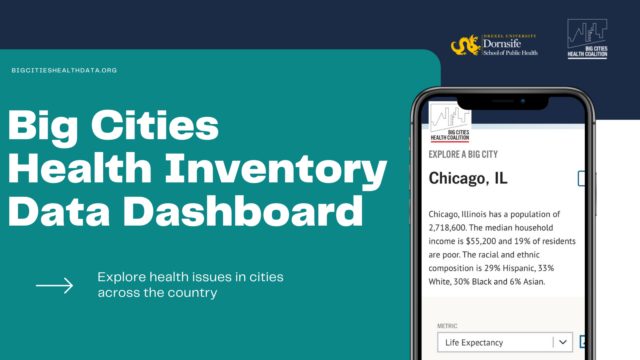Exploring Urban Health Data with Big Cities Health Coalition
January 2022

Data are essential to the practice of public health. Through a dynamic partnership with the Big Cities Health Coalition (BCHC), the Drexel Urban Health Collaborative (UHC) has updated and redesigned the Coalition’s Big Cities Health Inventory data platform.
The platform provides health-related data for BCHC member jurisdictions (currently 29 cities), which are among the country’s largest, most urban cities. Currently, the platform contains over 100,000 data points for more than 100 metrics. The topics covered by data in the platform include: life expectancy and deaths, access to health services, chronic health diseases, infectious diseases, maternal and child health, mental health and substance use, poisoning, violence and injury, social and economic factors, physical and built environment, and population demographics. The platform allows users to compare metrics within and across cities, visualize trends, and download charts and data.
To publicize the newly updated platform, both BCHC and UHC hosted a webinar on December 8th, 2021 where they discussed new features, use cases for health departments and other public health professionals, and functionality.
“One in five people in the United States, 20 percent, live in a city represented by the Big Cities Health Coalition. These cities really reflect a lot of what is going on in this country,” said Jen Kolker, MPH, policy and community engagement core co-lead at the UHC, on why she feels the data platform is important.
Chrissie Juliano, MPP, Executive Director of the Big Cities Health Coalition explained: “The platform data can be used to help identify and share best practices across city health departments as well as help cities inside and outside of BCHC members benchmark their cities’ data.”
She added, “We have really tried to make this platform in such a way that it can speak to anyone.”
When asked who is likely to use the data platform Jen Kolker explained: “Health department surveillance units and data analysts can use it. Researchers can use it, doctoral students, advocates, policy-makers. There’s really a place for almost anyone to play with these data and get out of it what they need.”
During the webinar, the team shared an infographic that looked at the platform’s metrics on maternal and child health in relation to CDC’s Healthy People 2030 goals. The infographic illustrates how users can use the platform’s data to assess progress relative to national benchmarks.
“We are going to be adding more metrics on a monthly basis,” mentioned Amy Auchincloss, PhD, MPH, research and data core co-lead at the UHC. “The data currently span the years 2010 to 2019. We will be updating metric data as data sources release new data.”
To stay up-to-date on the Big Cities Health Inventory please make sure to follow both the UHC (@DrexelUHC) and BCHC (@BigCitiesHealth) on Twitter or subscribe to our newsletters, which you can do on our websites.
Download the infographic.
Watch the webinar.
Visit bigcitieshealthdata.org
The platform is primarily funded by the CDC through a cooperative agreement with NACCHO. The views expressed here do not necessarily represent those of the funders.